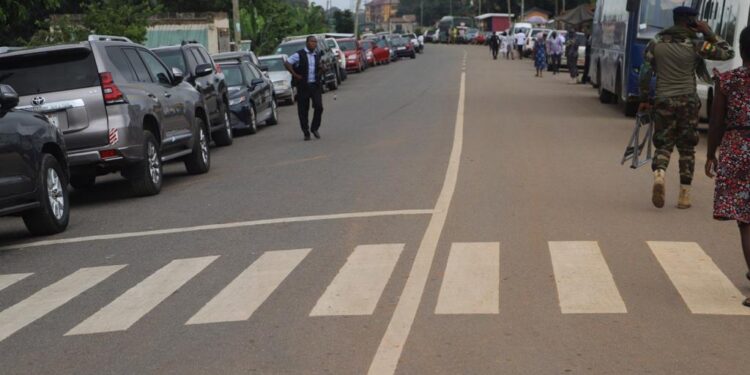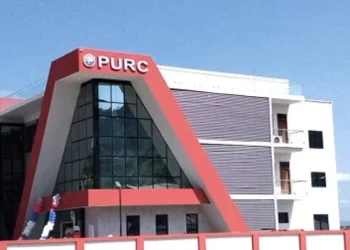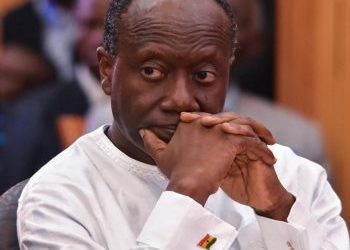THE DEPARTMENT OF URBAN ROADS has today issued a set of measures with the intention of limiting the movement of commercial motor tricycles, more generally referred to as “Pragias,” to particular regions inside the Kumasi Metropolis. The restriction will become active as of today, which is Monday, July 24.
At a press conference that was held on Monday in Kumasi and presided over by the KMA head of transport Mr. Randy Wilson, a map that defines the borders of the limited designated area that the operators of the popular Prajia are prohibited from entering was made public.
The Manhyia Palace, the Zongo Police Station, the Dunkirk Police Station, the Ridge Police Station, the Bekwai Round About, the KATH Round About, the Kumasi Zoo, the Adehye Market, and finally the Dr. Mensah neighbourhood are all included in the zone area.
There are no longer any off-limits areas for Pragia riders within the boundaries, including the Regional Police Headquarters in Adum, Kejetia, or the offices of the KMA. These locations are all strategic and are located within the boundaries.
Mr. Randy Wilson, who is in charge of urban roadways for the KMA, indicated that the restrictions have become necessary since the pragia operators pose a threat to the general public.
According to him, in particular, their incursion into the central business district has contributed to the deteriorating human and vehicular traffic situation in the region.
“In addition to the danger posed by these vehicles, a significant number of the mishaps that occur in the Metropolis are attributable to the reckless behaviour of the Prajia riders.” Further explanation was provided by Mr. Wilson.
He mentioned that the Pragia riders have already been told of this harsh decision, and he added that, in addition to this, the laws do not support their activities, which is the explanation for the restriction measure that has been chosen towards their operations as far as the Kumasi Metropolis is concerned.
MEASURES FOR TRANSPORT RE-ORGANISATION IN KUMASI
The Kumasi Metropolitan Assembly is working to reorganise the provision of transport services in the city in order to provide a response to the growing number of unlawful activities that have gained control of transport services and caused a great deal of congestion in the city. These efforts are being done in order to re-organize the provision of transport services in the city.
Backgrounds
1. The Danger Posed by Bicycles
At its meeting on the 29th of April, the General Assembly came to the conclusion that efforts should be taken to limit the activities that can be conducted by tricycles (Pragia/Aboboyaa/Adedeta) within the core of the CBD. This is done to ensure that the rising threat is contained before it can escalate to the point where every accessible space within sections of the CBD will be turned into a station or loading point for pragia. This is to ensure that the growing threat is contained.
2. Stations located on the Streets
Contrary to the judgements that were made in order for them to be allowed to function in the city, the number of on-street stations that are used for events that take place within the city has been increasing. While practically all of the stations have violated their mandates to maintain their allotted slots in a ‘congestion-free and clean’ manner, the majority of them have expanded the number of slots that have been allotted to them, while others have added more routes to their operations.
3. Obstacles to overcome when loading cargo during the day
During the hours of 9:00 am and 5:00 pm, the byelaws of the KMA state that cargo vehicles are not permitted to unload their shipments in the Central Business District (CBD). Additionally, it is not expected of them to park within certain portions of the CBD. The situation, however, has worsened as a result of the fact that they appear to run continuously throughout the day and park anywhere they choose, causing congestion.
4. Illegal stations
Illegal loading of vehicles, particularly those designed for long distance travel, has emerged as a significant barrier to the efficient functioning of transportation-related businesses within the city. Locations such as Central market, Pampaso, KATH roundabout, and Suame roundabout, amongst others, have developed into key hubs for the proliferation of illegal long-distance operations.
5. The absence of an appropriate database for management and planning purposes.
As a consequence of this, the city is currently unable to carry out the majority of the activities, including the allocation of slots, decisions about additional stations, enforcement efforts, and so on. It has also made the process of issuing licences and badges to unions, which in some manner support their operations and limit illegality, more difficult than it would have been otherwise.
Exercise Variations and Their Modalities
The following items comprise the Five Prong Approach that is being considered for adoption:
1. Regulations on the Use of Tricycles
The operators of tricycles (pragia and aboboyaa) should be barred from entering the CBD immediately. The following actions need be taken in order to accomplish this goal successfully. i. Establish a Committee or Team Comprised of Transport Management Stakeholders
to prepare and work out strategies that will be used
ii. Acquaint yourself with the recognisable tricycle drivers and have a conversation with them about the programmes that are planned.
and consider the issues that they raise. Make sure they are on board with the concept and willing to participate.
their personnel are under their command
iii. Meet with representatives from various media outlets in order to explain the procedures, as well as to get their understanding and support.
iii. Make known the prohibited areas, the dates when operations will begin, and the penalties that will be imposed on those who violate the rules.
2. Repackaging at on-street stations and stricter enforcement of daytime cargo loading regulations
policy
The On-street station was organised under the auspices of a number of different unions. It is also expected for cargo vehicles to operate within the guidelines of certain unions. Their activities are able to be easily regulated, as a result, and they should do so through their parent unions. In order for this to take place
i. In addition to the Leaders of the Transport Unions, Meet the Regional Executives of the Transport Unions
the On-Street Stations, Cargo Vehicles, and Other Related Things
ii. Reformat the operating guidelines and parameters that have been provided to them. iii. Help the on-street stations modernise their meeting procedures in order to make it simpler for the internal controls to do their jobs.
iv. Do the same for the cargo vehicles, but with more emphasis, so that specific leaders can act as focal points for following conversations and the transmission of information.
3. The abolition or restriction of stations that are operating illegally
All of the stations at these particular locations have been discovered as being unlawful, and as a result, they do not possess any permits that would allow them to function in this capacity. In order to put an end to these illegal actions once and for all, the following recommendations should be considered and put into practise.
i. It is required that all Unions and Stations that are active inside the city provide their Transport Operating Permits so that they can be inspected.
ii. Those who are conducting business at places that have been granted approval should be required to properly renew their permits or be forced to halt their operations until they have done so.
iii. It is imperative that every labour union be compelled to disclose information regarding its members’ drivers and cars in order to be eligible for the distribution of relevant stickers for business purposes. In the case that this is not done, a union should not be allowed to operate on a route.
iv. The penalties that have been outlined for illicit activities must to be repackaged and made public so
so as to guarantee equality in cases where one party is at fault
V. Carry out enforcement at these locations and implement the punitive measures so that they can act as a deterrent to other people.
4. Establishment of a Database for Use in Transportation Management
In order for the Assembly to effectively control and oversee the provision of transport services, as well as carry out its operations of tax mobilisation and enforcement, all transport unions were asked to provide data on their members, vehicles, and operational routes. This will allow the Assembly to more easily carry out its tasks. This is seen as a crucial means that will ensure that only cars that are legally mandated will be given the opportunity to operate within the CBD as well as at terminals that have been appropriately assigned.
To ensure that all legally operating vehicles have access to the right stations to work from, the assembly ought to step up the data collection efforts, as well as the issuance of permits and stickers. If vehicles are not allowed into the central business district because they do not have the proper stickers or loading privileges, the waawaa problem will be significantly reduced.
Important Steps to Take
i. The Assembly ought to release a Press Statement on the process of transport re-organization so that the general public would have a better understanding of what has been planned and is now being carried out.
ii. Appropriate institutions and agencies should be kept up to date with the latest information regarding the exercises. These include, but are not limited to, the Regional Minister and the Regional Security Council, as well as The Metro Security Council, Media Houses, Transport Unions, and so on.
iii. Activities that have been planned should be provided with the necessary assistance in order for them to be successful.
iv. Engage in extensive media engagements beginning with a briefing, followed by a press statement and radio and television conversations










Discussion about this post